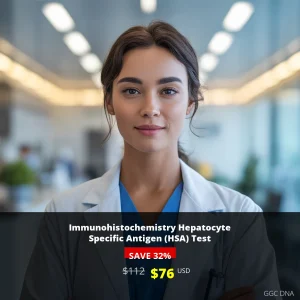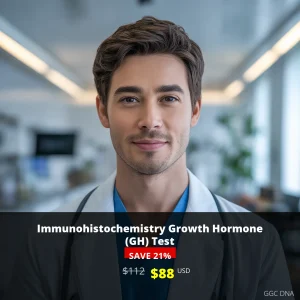Immunohistochemistry AFP Alpha-Fetoprotein Test
Comprehensive Introduction to AFP Immunohistochemistry Testing
The Immunohistochemistry AFP Alpha-Fetoprotein Test represents a cutting-edge diagnostic approach in modern oncology and pathology. This specialized laboratory procedure utilizes advanced immunohistochemical staining techniques to detect and visualize alpha-fetoprotein (AFP) expression directly within tissue samples. As a crucial tumor marker, AFP plays a vital role in identifying and characterizing various malignancies, particularly those originating from the liver and germ cells.
Immunohistochemistry (IHC) has revolutionized cancer diagnosis by allowing pathologists to examine specific protein markers at the cellular level. The AFP IHC test provides invaluable information that goes beyond traditional histopathology, enabling precise tumor classification and supporting targeted treatment decisions. This test is particularly important because AFP expression patterns can help distinguish between different types of cancer and provide prognostic information that guides clinical management.
What the AFP Immunohistochemistry Test Measures and Detects
The Immunohistochemistry AFP test specifically detects the presence and distribution of alpha-fetoprotein protein within tissue specimens. This sophisticated diagnostic tool measures:
- Alpha-fetoprotein Expression: Identifies the presence of AFP protein in tumor cells using specific antibodies
- Cellular Localization: Determines whether AFP is expressed in the cytoplasm, nucleus, or cell membranes
- Staining Intensity: Assesses the strength of AFP expression, which can correlate with tumor aggressiveness
- Distribution Pattern: Evaluates how AFP is distributed throughout the tumor tissue
- Tumor Differentiation: Helps classify tumors based on their AFP expression characteristics
This test is particularly valuable for detecting hepatocellular carcinoma (liver cancer), germ cell tumors, yolk sac tumors, and certain types of teratomas. The visualization of AFP at the cellular level provides critical diagnostic information that serum AFP tests alone cannot offer.
Who Should Consider AFP Immunohistochemistry Testing
This advanced diagnostic test is recommended for individuals presenting with specific clinical scenarios and symptoms:
Clinical Indications
- Patients with liver masses or lesions suspicious for hepatocellular carcinoma
- Individuals with testicular or ovarian masses that may represent germ cell tumors
- Patients with elevated serum AFP levels requiring tissue confirmation
- Cases where metastatic cancer of unknown primary origin is suspected
- Children and young adults with abdominal or pelvic masses
- Patients with mediastinal masses that could represent germ cell tumors
Symptoms and Risk Factors
- Unexplained abdominal pain or discomfort
- Palpable abdominal masses or organ enlargement
- Unexplained weight loss and fatigue
- Abnormal liver function tests
- History of hepatitis B or C infection
- Cirrhosis or chronic liver disease
- Family history of liver cancer
Key Benefits of AFP Immunohistochemistry Testing
Choosing the Immunohistochemistry AFP test provides numerous advantages for accurate cancer diagnosis and management:
Diagnostic Precision
- Enhanced Accuracy: Provides definitive evidence of AFP production at the cellular level
- Tumor Classification: Helps distinguish between different types of liver tumors and germ cell neoplasms
- Differential Diagnosis: Aids in differentiating hepatocellular carcinoma from other liver malignancies
- Prognostic Information: AFP expression patterns can provide insights into tumor behavior and prognosis
Clinical Management Advantages
- Treatment Guidance: Supports selection of appropriate targeted therapies
- Surgical Planning: Provides critical information for surgical decision-making
- Monitoring Response: Can be used to assess treatment effectiveness in follow-up biopsies
- Metastasis Detection: Helps identify the origin of metastatic tumors
Understanding Your Test Results
Interpreting AFP Immunohistochemistry results requires specialized expertise from trained pathologists. Here’s a general guide to understanding your test outcomes:
Positive Results
- Strong Positive: Intense brown staining indicates high AFP expression, typically seen in hepatocellular carcinoma and yolk sac tumors
- Focal Positive: Patchy staining may suggest tumor heterogeneity or mixed tumor types
- Weak Positive: Light staining might indicate low-level AFP production or early tumor development
Negative Results
- True Negative: No staining observed, suggesting the tumor does not produce AFP
- Technical Negative: May require repeat testing if clinical suspicion remains high
Clinical Correlation
Your healthcare provider will interpret the results in the context of your clinical history, imaging findings, and other laboratory tests. Positive AFP staining typically supports diagnoses of:
- Hepatocellular carcinoma
- Yolk sac tumor (endodermal sinus tumor)
- Embryonal carcinoma
- Mixed germ cell tumors
- Some hepatoblastomas
Test Pricing and Availability
| Price Type | Amount (USD) |
|---|---|
| Discount Price | $76 |
| Regular Price | $126 |
Turnaround Time
- Sample Submission: Daily by 6 PM
- Standard Tissue Biopsy: 5 days
- Large Complex Tissue: 7 days
- Report Block: 5 days
Sample Requirements
For accurate testing, please provide:
- Tumor tissue in 10% formal-saline OR formalin-fixed paraffin-embedded block
- Copy of Histopathology report
- Site of biopsy documentation
- Complete clinical history
>Ship at room temperature
Nationwide Availability Across USA
We have diagnostic branches conveniently located in all major cities throughout the United States, including:
- New York City, NY
- Los Angeles, CA
- Chicago, IL
- Houston, TX
- Phoenix, AZ
- Philadelphia, PA
- San Antonio, TX
- San Diego, CA
- Dallas, TX
- San Jose, CA
Our nationwide network ensures that patients across the country have access to this advanced diagnostic testing with consistent quality and rapid turnaround times.
Take Action for Your Health Today
Don’t wait to get the answers you need for accurate cancer diagnosis and treatment planning. The Immunohistochemistry AFP Alpha-Fetoprotein Test provides critical information that can significantly impact your treatment journey and outcomes.
Book your test now or speak with our specialists:
Phone/WhatsApp: +1(267) 388-9828
Our experienced team is ready to assist you with scheduling, answer your questions about the testing process, and ensure you receive the comprehensive care you deserve. Early and accurate diagnosis is the first step toward effective treatment and better health outcomes.







